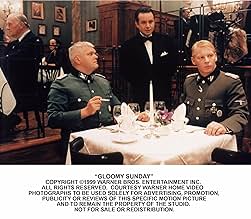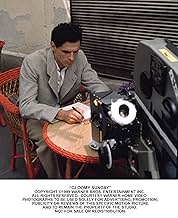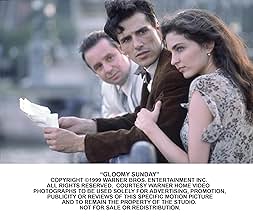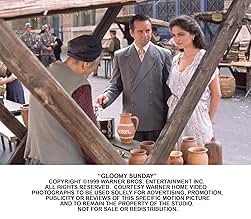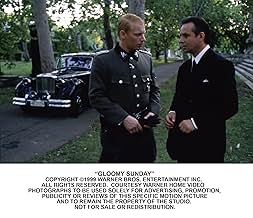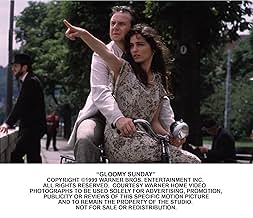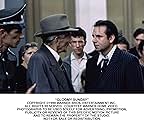Une chanson d'amour et de mort
Titre original : Gloomy Sunday - Ein Lied von Liebe und Tod
NOTE IMDb
7,8/10
8,7 k
MA NOTE
Ajouter une intrigue dans votre langueFollows three men who are in love with a beautiful waitress during World War II: an intellectual restaurant owner, a mysterious musician, and an erratic businessman.Follows three men who are in love with a beautiful waitress during World War II: an intellectual restaurant owner, a mysterious musician, and an erratic businessman.Follows three men who are in love with a beautiful waitress during World War II: an intellectual restaurant owner, a mysterious musician, and an erratic businessman.
- Réalisation
- Scénario
- Casting principal
- Récompenses
- 7 victoires et 5 nominations au total
Avis à la une
This film is about the life of a woman, who got caught between 2 lovers against a backdrop of the turbulent times of the Holocaust.
Words cannot describe how beautiful and powerful this film is. Everything is excellent. The sets are beautiful, and the scenes are beautifully composed. Ilona is great as the lady which every men would fall in love with. She has this graceful elegance which is very magnetic. Laszlo's work as the restaurant owner is convincing, he has every detail of the restaurant under control. The music is great. When I listened to the song "Gloomy Sunday', I felt this chill spreading through my body, as if I was going to be the next victim. Another highlight for me is the uptight secretary who lives by the book, which is clearly a satire about the German culture. The plot is highly touching and powerful, and I do urge everyone to see this beautiful film.
Words cannot describe how beautiful and powerful this film is. Everything is excellent. The sets are beautiful, and the scenes are beautifully composed. Ilona is great as the lady which every men would fall in love with. She has this graceful elegance which is very magnetic. Laszlo's work as the restaurant owner is convincing, he has every detail of the restaurant under control. The music is great. When I listened to the song "Gloomy Sunday', I felt this chill spreading through my body, as if I was going to be the next victim. Another highlight for me is the uptight secretary who lives by the book, which is clearly a satire about the German culture. The plot is highly touching and powerful, and I do urge everyone to see this beautiful film.
Fact and fiction combine to provide a delightfully entertaining film about a restaurant in Budapest. Clientele flocked there for the good food, the good music and I daresay the beautiful Ilona who served on the tables. What more could one wish for? Unfortunately the good times do come to an end when the Nazis sweep into Hungary and decide forthwith to eliminate the Jewish population.
Strange as it may seem the whole theme of the film revolves around a plaintive tune which first gained popularity in Budapest, later in Europe and then the whole world. The words to the song called "Gloomy Sunday" are full of despair.
The clients who came to the restaurant always asked for this particular melody to be played on the grand piano. It is played many times during the film. It is haunting and addictive. We find ourselves wanting to hear it again and again such is its hypnotic power.
All praise to Erika Marozsan who provides the romantic interest as Ilona in the story. I am told she is a newcomer to the screen, but as an actor she will surely be much sought after in the future. She is beautiful and her close-ups full of feeling. She has lovely hands that caress a lover's face with such gentle charm. She is much admired by Lazlo (Joachim Krol) owner of the restaurant and also by Andras (Stefano Dionisi) newly appointed pianist and composer of "Gloomy Sunday".
All goes well for the threesome until the arrival of a Nazi officer (Ben Becker) who takes a fancy to Ilona despite her constant rebuttals. In their position of power Nazis have the means of disposing of people who stand in their way.
This is a film of contrasts. First we have the beautiful setting which is Budapest, romantic songs and people in love. Then we have the Nazi occupation, loss of freedom and threats of Auschwitz.
This film must be seen to the end. There is an amazing twist of Fate in the last few minutes and it seems to me that at last in some remarkable way justice is seen to be done.
Strange as it may seem the whole theme of the film revolves around a plaintive tune which first gained popularity in Budapest, later in Europe and then the whole world. The words to the song called "Gloomy Sunday" are full of despair.
The clients who came to the restaurant always asked for this particular melody to be played on the grand piano. It is played many times during the film. It is haunting and addictive. We find ourselves wanting to hear it again and again such is its hypnotic power.
All praise to Erika Marozsan who provides the romantic interest as Ilona in the story. I am told she is a newcomer to the screen, but as an actor she will surely be much sought after in the future. She is beautiful and her close-ups full of feeling. She has lovely hands that caress a lover's face with such gentle charm. She is much admired by Lazlo (Joachim Krol) owner of the restaurant and also by Andras (Stefano Dionisi) newly appointed pianist and composer of "Gloomy Sunday".
All goes well for the threesome until the arrival of a Nazi officer (Ben Becker) who takes a fancy to Ilona despite her constant rebuttals. In their position of power Nazis have the means of disposing of people who stand in their way.
This is a film of contrasts. First we have the beautiful setting which is Budapest, romantic songs and people in love. Then we have the Nazi occupation, loss of freedom and threats of Auschwitz.
This film must be seen to the end. There is an amazing twist of Fate in the last few minutes and it seems to me that at last in some remarkable way justice is seen to be done.
I did not necessarily expect this to be a real good movie. Stories taking place during the Nazi regime and WW2, especially when made by Germans, sometimes tend to be ultra-politically-correct. But, surprise, surprise. Rolf Schübel's first feature (he did documentaries before) uses backdrop of Nazi-occupied Budapest to deliver a meaningful "menage-a-quatre", wrapped in a free interpretation of creation of famous suicide hymn "Gloomy Sunday". Fine acting all over the place, especially by Krol and Becker (still brave in German moviemaking to show a Nazi not as a complete monster, even if he is, after all, the bad guy), and despite the overall sad story executed surprisingly lighthanded. Drama, a touch of humor, some suspense and even some sex (however, the latter seems to be unnecessary sometimes - it would have worked without or with less). Not to be forgotten: excellent soundtrack album, including several versions of "Gloomy Sunday". Definitely one of the best German movies of 1999.
The late 90s through the early 00s were a breeding ground for urban legends, as we saw in Magnolia (1999), Darwin Awards (2006) and of course the Urban Legends film & TV franchise spanning the decade. Maybe it's due to the fact that the internet, with its viral sensationalism, had just become popular while fact-checking resources had not yet caught up. This made for some very creative storytelling at the expense of truth. But heck, isn't that what storytelling is all about.
Here we have "Gloomy Sunday" (1999) an intriguing story woven around the titular song which, as urban legend has it, caused or accompanied some 20 suicides (exaggerated to "hundreds" in the film). In reality, the song has never been credibly linked to any suicides except that a lot of people in Hungary killed themselves in the 30s when the song was recorded. But I dunno, maybe Hungary's Great Depression had a little more of a role in that statistic?
Enough history. The rest of my review approaches this film as a pure work of fiction, and it's a pretty good one. It's not simply a 2-dimensional message like "sad songs kill people" but it cuts more to the root of what suicide is, the complexity of what motivates it (not just having a sucky life, otherwise a lot more of us would be at the bottom of San Francisco Bay), and how music, art, love and war resonate with the concept of killing oneself.
The story revolves around a love rectangle between the song's composer (a piano player in a restaurant), a waitress, the restaurant owner and a regular diner in the resaurant. But it's no ordinary "jealous lover" type of cliché. Rather, the theme of love, just like the theme of death, is that it is a personal choice that cannot be subjected to society's morals or rules. In other words, the lovers place no conventional expectations on each other (though fury & resentment does play into it). Immediately it strikes you as a love story worth paying attention to.
Next comes the theme of war, particularly World War II and the Nazi persecution of Jewish people. This adds tremendous spice, depth and peril to the situation. It's handled in a subtle yet chilling way that reminds me of the excellent Benigni film around the same time "Life Is Beautiful".
Last but certainly not least is the story's climax and resolution which, itself is worth the price of admission. Let's just say I did not see it coming. And when a film can do that (without being ridiculous) I'm always impressed. I can't imagine anyone who wouldn't be.
The music itself is nice, if you like the song "Gloomy Sunday", but if I were to nitpick, I have to say I didn't like the Heather Nova cover of the song at the closing credits because it featured the "updated" lyrics that were added to the English version in 1936 to make it less depressing (I'm talking about the "dreaming, I was only dreaming" part). I know Billie Holiday popularized that amendment in her famous version, but Billie is allowed to do whatever she damn wants!
Bottom line: great story, great production, great acting & cinematography. But, as with the excellent film "Amadeus", don't expect to study for your musical history exam by watching it. This is creative storytelling at its best.
Here we have "Gloomy Sunday" (1999) an intriguing story woven around the titular song which, as urban legend has it, caused or accompanied some 20 suicides (exaggerated to "hundreds" in the film). In reality, the song has never been credibly linked to any suicides except that a lot of people in Hungary killed themselves in the 30s when the song was recorded. But I dunno, maybe Hungary's Great Depression had a little more of a role in that statistic?
Enough history. The rest of my review approaches this film as a pure work of fiction, and it's a pretty good one. It's not simply a 2-dimensional message like "sad songs kill people" but it cuts more to the root of what suicide is, the complexity of what motivates it (not just having a sucky life, otherwise a lot more of us would be at the bottom of San Francisco Bay), and how music, art, love and war resonate with the concept of killing oneself.
The story revolves around a love rectangle between the song's composer (a piano player in a restaurant), a waitress, the restaurant owner and a regular diner in the resaurant. But it's no ordinary "jealous lover" type of cliché. Rather, the theme of love, just like the theme of death, is that it is a personal choice that cannot be subjected to society's morals or rules. In other words, the lovers place no conventional expectations on each other (though fury & resentment does play into it). Immediately it strikes you as a love story worth paying attention to.
Next comes the theme of war, particularly World War II and the Nazi persecution of Jewish people. This adds tremendous spice, depth and peril to the situation. It's handled in a subtle yet chilling way that reminds me of the excellent Benigni film around the same time "Life Is Beautiful".
Last but certainly not least is the story's climax and resolution which, itself is worth the price of admission. Let's just say I did not see it coming. And when a film can do that (without being ridiculous) I'm always impressed. I can't imagine anyone who wouldn't be.
The music itself is nice, if you like the song "Gloomy Sunday", but if I were to nitpick, I have to say I didn't like the Heather Nova cover of the song at the closing credits because it featured the "updated" lyrics that were added to the English version in 1936 to make it less depressing (I'm talking about the "dreaming, I was only dreaming" part). I know Billie Holiday popularized that amendment in her famous version, but Billie is allowed to do whatever she damn wants!
Bottom line: great story, great production, great acting & cinematography. But, as with the excellent film "Amadeus", don't expect to study for your musical history exam by watching it. This is creative storytelling at its best.
10crisbob
Beautiful Budapest, end of the thirties. Lazlo Szabo a middle-aged jew Hungarian runs a chic restaurant with a beautiful waitress,Ilona who is also his mistress. One day they decide to hire a pianist, and it's Ilona who choose. And it's a good choice because the handsome young man, Andras, creates a wonderful mood on the premises. Little by little he falls desperately in love with Ilona and composes specially for her a song, very melancholic, and a bit misterious. He calls it " Gloomy sunday ". This song brings surprisingly a lot of suicides. The love-triangle functions pretty well until the time a german customer, Hans, who comes regularly in the restaurant falls in love with Ilona, without success.A few years later the german army invades Hungary, Hans is back as a highly placed officer and the jewish condition of Lazlo is going to complicate the lives of the four protagonists. This movie is a master- piece and I'd bet if the film had been produced in Hollywood with Stone, Douglas and Harrison Ford, directed by Cassavetes it would have gained several Oscars. It has all a movie fan can expect from a good film -and more. Beautiful scenery, very good story, marvelous music, talent of the actors, and even a bit of sex. I rarely see a picture twice on the same day. This time I did.
Le saviez-vous
- AnecdotesWieck, the Nazi played by Ben Becker, is a fictionalized SS Col. Kurt Becher, who was acquitted in Nuremberg of war crimes and who ended up the richest man in Germany.
- GaffesAt a movie theater, the trio watches a newsreel that declares that the song "Gloomy Sunday" "drove 157 people in Hungary to suicide in the past eight weeks." It's unknown whether that statement ever actually appeared in a German newsreel during the war. There is no evidence that the song ever actually drove more than a handful of people--if any--to suicide.
- ConnexionsFeatured in Section K3: Un amour de jeunesse (1999)
- Bandes originalesSzomorú Vasárnap/Gloomy Sunday
Music by Rezsö Seress
Lyrics by László Jávor
English lyrics by Sam Lewis (as Sam M. Lewis)
Akla Musikverlag Berlin
Meilleurs choix
Connectez-vous pour évaluer et suivre la liste de favoris afin de recevoir des recommandations personnalisées
- How long is Gloomy Sunday?Alimenté par Alexa
Détails
- Date de sortie
- Pays d’origine
- Langues
- Aussi connu sous le nom de
- Gloomy Sunday
- Lieux de tournage
- Sociétés de production
- Voir plus de crédits d'entreprise sur IMDbPro
Box-office
- Montant brut aux États-Unis et au Canada
- 585 604 $US
- Week-end de sortie aux États-Unis et au Canada
- 7 102 $US
- 22 juin 2003
- Montant brut mondial
- 646 532 $US
- Durée
- 1h 52min(112 min)
- Couleur
- Mixage
- Rapport de forme
- 1.85 : 1
Contribuer à cette page
Suggérer une modification ou ajouter du contenu manquant


